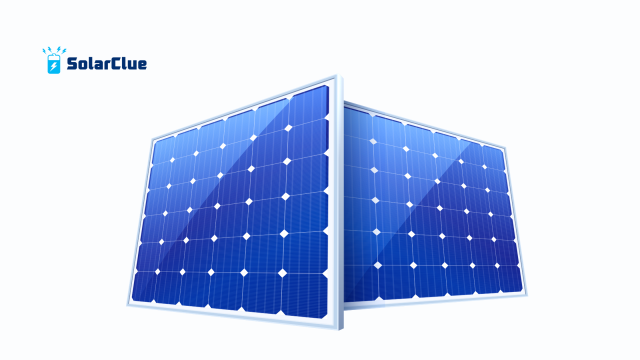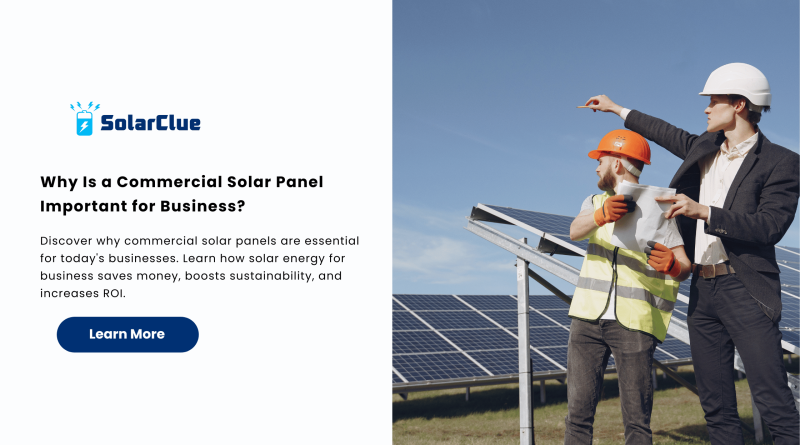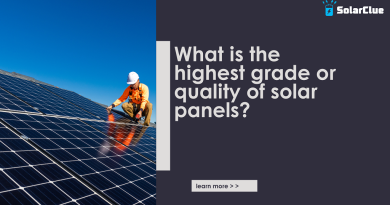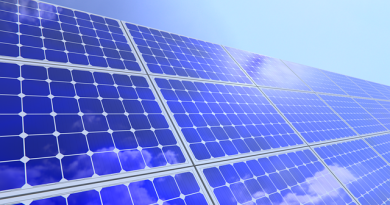Why Is a Commercial Solar Panel Important for Business?
Why Commercial Solar Panel Important for Business? In an era where sustainability and cost-efficiency are top business priorities, adopting solar energy for business is more important than ever. Whether you’re running a small enterprise or managing a large corporation, investing in commercial solar panels offers a strategic advantage. From financial savings to environmental responsibility, this blog will explain why switching to solar power is not just a trend, but a smart business decision?
The Rising Importance of Renewable Energy in Business
Table of Contents
The Shift Toward Sustainability
Companies worldwide are recognizing the need to reduce carbon footprints. Embracing solar energy supports this mission and aligns your business with global environmental goals.
Government Incentives and Tax Benefits
Governments offer attractive tax credits and rebates for commercial solar installation, making it a financially sound investment.
Key Benefits of Commercial Solar Panels
1. Cost Savings and ROI
Businesses can drastically cut energy bills by utilizing solar power installation. Over time, these savings translate into a high return on investment.
2. Energy Independence
With solar panels, companies can generate their own electricity, reducing reliance on unpredictable grid energy and pricing.
3. Brand Image and Customer Trust
Adopting solar panel systems reflects a commitment to sustainability, improving brand image and strengthening customer relationships.
4. Low Maintenance, Long-Term Gains
Commercial solar panels require minimal maintenance and offer durability for over 25 years, making them a reliable long-term solution.
Why Commercial Solar Panel Important for Business

Tailored Solutions for Different Industries
From retail and manufacturing to IT and hospitality, customized solar panel systems meet diverse business energy demands.
Scalability and Flexibility
Commercial solar installation is scalable. Whether you want to power an entire facility or supplement existing energy needs, solutions are flexible.
Grid Integration and Net Metering
Modern solar power systems integrate with local grids, and excess energy can be sold back via net metering, adding an extra revenue stream.
Factors to Consider Before Installation
1. Site Assessment
A professional site evaluation determines the optimal layout for solar panel installation, ensuring maximum energy capture.
2. Energy Usage Analysis
Understanding your business’s energy consumption helps design a system that aligns with your needs.
3. Choosing the Right Installer
Working with certified and experienced providers ensures a seamless commercial solar installation process. Learn more about trusted solutions at solarclue.com.
Real-World Case Studies
Company A: Manufacturing Unit
After installing commercial solar panels, this factory reduced energy bills by 60% and achieved ROI in just four years.
Company B: Retail Chain
A chain of stores used solar energy for business to power operations, enhancing sustainability while cutting annual costs.
Overcoming Common Myths
Myth 1: Solar Power Is Too Expensive
Thanks to falling equipment costs and tax benefits, solar panel adoption is more affordable than ever.
Myth 2: Solar Panels Don’t Work on Cloudy Days
Solar power systems still generate energy under cloudy conditions—just at a slightly reduced rate.
Myth 3: Installation Is Disruptive
Professional teams ensure smooth and non-intrusive solar power installation processes.
How to Start Your Solar Journey
Consultation and Proposal
Get a personalized assessment and quote tailored to your business’s energy needs.
Financing Options
Choose from leasing, loans, or power purchase agreements to make the transition financially feasible.
Post-Installation Support
Reliable providers offer ongoing monitoring and support to ensure your solar energy system runs efficiently.
The Future of Solar Power in Business
Integration with Smart Tech
Solar panels now come with smart monitoring systems for better efficiency and control.
ESG Compliance
Environmental, Social, and Governance (ESG) compliance is becoming a standard—solar power helps businesses meet those expectations.
Energy Resilience
In an age of increasing power outages, solar energy offers resilience and operational continuity.
Conclusion
Switching to commercial solar panels is a strategic move that brings measurable financial, environmental, and brand benefits. From saving on utility bills to showcasing your commitment to a greener future, the benefits are undeniable.
Explore your solar journey with confidence—visit solarclue.com or dive deeper into insights on blog.solarclue.com today!
FAQs
1. How much can a business save with commercial solar panels?
Savings vary, but many businesses report 50–70% reductions in energy bills post-installation.
2. Are there government subsidies for solar energy for businesses?
Yes, most governments offer tax credits, accelerated depreciation, and rebates to support solar panel adoption.
3. How long does commercial solar installation take?
Installation typically takes 1–3 months, including site inspection, design, and system deployment.
4. Can solar panels power an entire business facility?
Yes, with the right system size and layout, businesses can fully power their operations using solar power.
5. Is maintenance expensive for commercial solar systems?
Not at all. Commercial solar panels are low-maintenance and designed to last over two decades with minimal servicing.
Empower your business with the sun—explore smarter energy at solarclue.com now!




